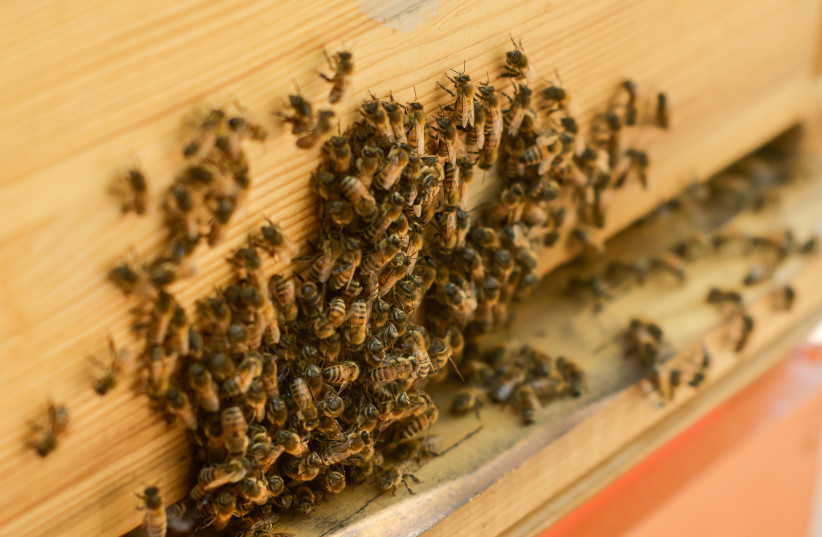Nestled in a nook of eastern Jerusalem, the Central Library embraces its role as a haven of knowledge. But beyond the shelves replete with literary treasures, the Muslala Sinsila Center graces the space above them. Stepping onto the upper terrace, a delicate infusion of honeyed fragrance greets the visitor, while the gentle buzz of bees casts a hypnotic spell.
The Muslala Sinsila Center is the brainchild of architect and planner Tareq Massar, who grew up in the Old City of Jerusalem. After graduating with a BA in architecture and working for the UN in the United States, Massar considers that “architecture doesn’t help communities that much.”
His journey took an inspiring turn when he received a scholarship to pursue a master’s degree in urban planning with a focus on sustainability in Stuttgart, Germany. Armed with this new knowledge, he returned to Jerusalem with a vision to give back to his community by merging architecture and sustainability. Upon his return, Massar became aware of the frustration that the younger generation of Palestinians in Jerusalem felt – and the limited employment opportunities for Arab women.
“And then I found out there was no hope.” He says “hope” is precisely what “the new young generation needs.” This made him spring into action.
“So I said, ‘Okay, maybe we need to use the roofs, at least to build some green elements, to have green roofs in east Jerusalem because we are missing public open spaces,’” says Massar.

The center’s overarching mission is twofold: to economically empower local women and young adults – reflecting the dire situation outlined by the Jerusalem Institute for Policy Research, citing nearly 75% of east Jerusalem’s Arab women as facing unemployment – and to champion urban initiatives centered around sustainability and ecology. One such initiative, of paramount importance, aims to combat the pressing threat of global honeybee extinction.
The decline of bees and their potential extinction is a significant concern as it disrupts the delicate balance of ecosystems, leading to reduced crop yields, loss of biodiversity, and a detrimental impact on food production and availability, posing a serious threat to global food security and ecological stability.
Bees play a crucial role in the food chain as pollinators, facilitating the reproduction of various plants, and ensuring the production of fruits, vegetables, and nuts that form the foundation of our diverse and nutritious diets.
The Muslala Sinsila Center was established four years ago by Massar, inspired by a project created by Muslala on the roof of Jerusalem’s Clal Center.
“I said, ‘We have to have something like this in east Jerusalem too,’” he recalls.
What's the buzz at the Muslala Sinsila Center?
The Sinsila Center houses around 31,000 bees on the bee farm that lies behind the building and on the beautiful flowering green roof. The roof is divided into two different sections. One section houses wooden planters filled with flowering plants and herbs. The flowers surround benches and cushions that are laid out for people to relax and enjoy a cup of coffee or tea outside. The second section of the roof holds a large beehive and vermicomposter. Bees surround the rooftop, flying from flower to flower, transferring pollen.
In the backyard of the center lies the bee farm. Spread throughout the yard are various beehives. The queen bee sits in the center of the hives, producing eggs. On the wooden slats that are built into the hives by the center’s main beekeeper are globs and blobs of honey. The bees fly around the yard, fiercely protecting their hives.
Over the past four years, the center has certified 131 female beekeepers in the community. It is also incorporating more workshops every year, such as carpentry and basket-weaving, in order to equip these women with additional skills.
Consistency is the key component of the process of beekeeping. The goal of the center is for the women to cultivate their own hives and produce their own supplies of honey.
Massar delivers beehives to each woman who participates in the program, and it is their responsibility to sustain them. Beekeeping is dependent on a healthy location, consistently inspecting the hive, taking the honey when it is ready, and making sure the bees are safe from harmful external factors such as animals.
The women of the center have the option to either sell their honey or take advantage of offers to work in schools, where they can teach the importance of sustainability and urban farming.
“We’ve even created new green jobs, which means there is no competition for them. We’re talking about urban and rural-urban farming and root gardening,” Massar explains.
The community has now come together in a beautiful way because of the Muslala Sinsila Center. Women in the community are now for the first time contributing to their family’s economic success and future.
“It is not just about the news anymore; we have built something with the community that we will fight for,” says Massar.
The Environment and Climate Change portal is produced in cooperation with the Goldman Sonnenfeldt School of Sustainability and Climate Change at Ben-Gurion University of the Negev. The Jerusalem Post maintains all editorial decisions related to the content.
